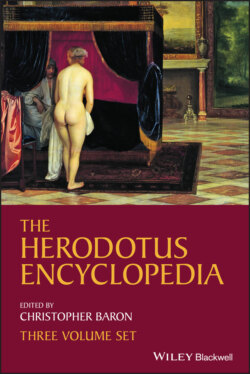Читать книгу The Herodotus Encyclopedia - Группа авторов - Страница 15
Оглавление
SYNOPSIS OF ENTRIES
This overview is arranged along thematic and conceptual lines, divided into three sections: 1) Text (the physical work and its reception); 2) Context (historical, intellectual, social, and cultural background); 3) Histories (its internal features as a literary work). The synopsis is necessarily schematic; the treatment offered in many entries will range well beyond the label they receive here.
The Synopsis does not contain the vast majority of the proper names found in the Histories (individuals, places, topographical features, tribes), all of which receive their own headword.
Major Categories (in bold and ALL CAPS) and Subcategories (ALL CAPS) receive their own entry unless they are bracketed.
I. Text
1.1 [TEXT AND TRANSMISSION]
book divisions
editions
manuscripts
papyri
scholia
translations
1.2 [SCHOLARSHIP]
archaeology
epigraphy1.2.1 SCHOLARSHIP ON HERODOTUS, ANCIENT GREECE AND ROMEAristarchus of Samothrace1.2.2 SCHOLARSHIP ON HERODOTUS, RENAISSANCE AND EARLY MODERN1.2.3 SCHOLARSHIP ON HERODOTUS, 1750–1945Jacoby, FelixMacan, Reginald WalterPowell, John EnochStein, Heinrich1.2.4 SCHOLARSHIP ON HERODOTUS, 1945–2018anthropologyAsheri, DavidBlack Athenacounterfactual historyImmerwahr, Henry“Liar School”Momigliano, ArnaldonarratologyOrientalismThemistocles Decree
1.3 [RECEPTION]
“Father of History”
reliability1.3.1 RECEPTION OF HERODOTUS, ANCIENT GREECE AND ROMEAristophanesAristotleCtesiasDionysius of HalicarnassusEphorusHellenistic historiansJosephusLucianPlutarchStraboTheopompus of ChiosThucydidesXenophon1.3.2 RECEPTION OF HERODOTUS, CHRISTIAN1.3.3 RECEPTION OF HERODOTUS, 1300–1750Valla, Lorenzo1.3.4 RECEPTION OF HERODOTUS, 1750–1900Rawlinson, Henry and George1.3.5 RECEPTION OF HERODOTUS, 1900 TO PRESENTcinematravel literature
II. Context
2.1 [HISTORICAL BACKGROUND]
2.1.1 GREECE (see HELLAS)Archaic AgeAthenian EmpirecleruchycolonizationDelian Leaguedialects, GreekemporionethnicityHellenic LeaguehelotsHeroic AgeIonian RevoltmedizeOath of PlataeaPanhellenismPeloponnesian LeaguePeloponnesian WarPersian Warsships and sailing
2.1.2 PERSIABardiya (see Smerdis)Bisitunconcubinesearth and watereunuchsNear Eastern historyPersepolisproskynesisreligion, PersianRoyal Roadsatrapiestiara
2.2 [INTELLECTUAL AND LITERARY BACKGROUND]
display (epideixis)
etymology
fable
genealogies
logos
orality and literacy
periplus
Persica
rhetoric
Seven Sages
sophists
2.2.1 POETRYAeschylusepic poetryHesiodHomerPindarSimonides of CeosSophoclestragedy
2.2.2 PROSEHecataeusIonic dialectmedical writers
2.2.3 SCIENCEclimategeologymedicinephilosophy
2.3 [SOCIETY]
athletes and athletic games
bribery
bronze
death
disease
dress
education, ancient
games
gender
hunting
iron
monuments
music
pederasty
prostitution
slavery
textiles
travel
writing
2.3.1 FAMILYchildrendomestic economymarriagewomen in ancient Greece
2.3.2 POLISacropolisagoraassemblydemeperioeciproxenosprytaneionwalls
2.3.3 [GOVERNMENT]aristocracydecision‐makingdemocracyephorsisonomialotmonarchyoligarchystasistyrants
2.3.4 LAWjudgesmurderpunishment
2.3.5 [ECONOMY]goldhandicraftsminingmoneysilvertalenttradetribute
2.3.6 FOODagriculturefeastingmeatwine
2.3.7 ENGINEERINGbridgescanalsharbors
2.3.8 ARTarchitecture (temples)monumentalitysculpturevessels (drinking)
2.4 GODS AND THE DIVINE
altars
apparitions
curses
festivals
first fruits
heroes and hero cult
mysteries
myth
pollution
priests and priestesses
religion, Greek
religion, Herodotus’ views on
sacrilege
suppliants
temples and sanctuaries
treasuries
tripod
2.4.1 RITUALdedicationshuman sacrificelibationsoathsprayersacrifice
2.4.2 PROPHECYdivinationdreamsoracles
2.5 WARFARE
allies
espionage
fortifications
hostages
plunder
prisoners of war
treachery
2.5.1 ARMIESarcherycavalrychariotsgenerals and generalshiphoplitesImmortalsmercenariessiege warfare
2.5.2 WEAPONS AND ARMOR
2.5.3 NAVAL WARFAREtrireme
2.6 [VALUES]
aretē
competition
courage
freedom
friendship
guest‐friendship
honor
piety
shame
wealth and poverty
III. Histories
3.1 HERODOTUS OF HALICARNASSUS
Athens and Herodotus
date of composition
Lygdamis son/grandson of Artemisia
Panyassis
Thurii
Vita Homeri
3.2 HISTORICAL METHOD
analogy
autopsy
causation
change
erga
evidence
historiē
inscriptions
knowledge
proof
source citations
sources for Herodotus
thōmata
truth
tychē
3.3 [NARRATIVE ART]
audience
authority, narrative
catalogues
characterization
cross‐references
digressions
end of the Histories
metanarrative
metaphor
motivation
numbers
prologue
proverbs
ring composition
short stories
symbols and signs
3.4 SPEECHES
“Constitutional Debate”
3.5 [THEMES]
advisers
archē
blame
cities
conquest
deception
desire
despotism
disabilities
disaster
drinking and drunkenness
exile
extremes
fame
fate
fetters
fire
hair
happiness
hubris
humor
insults
inventions
islands
madness
memory
mutilation
nakedness
necessity
praise
rape
rebellion
reciprocity
sex
softness
suicide
theft
vengeance
viewing
violence
whipping
women in the Histories
3.6 ETHNOGRAPHY
anthropophagy
autochthony
barbarians
bodily adornment
burial customs
circumcision
migration
mummification
nomads
nomos
pyramids
3.7 GEOGRAPHY
boundaries
maps
measures
3.8 [NATURAL WORLD]
bitumen
earthquakes
eclipses
weather
winds
3.8.1 [ANIMALS]ants, giantbirdscamelscattlecrocodilesdogsfishgriffinshorseslionsmulespigssnakes
3.8.2 LANDSCAPEdesertsriversseatrees
3.9 LANGUAGE AND COMMUNICATION
gestures
heralds
interpreters
laughter
messengers
3.10 EMOTIONS
anger
grief
jealousy
weeping
3.11 TIME
calendars
chronology
